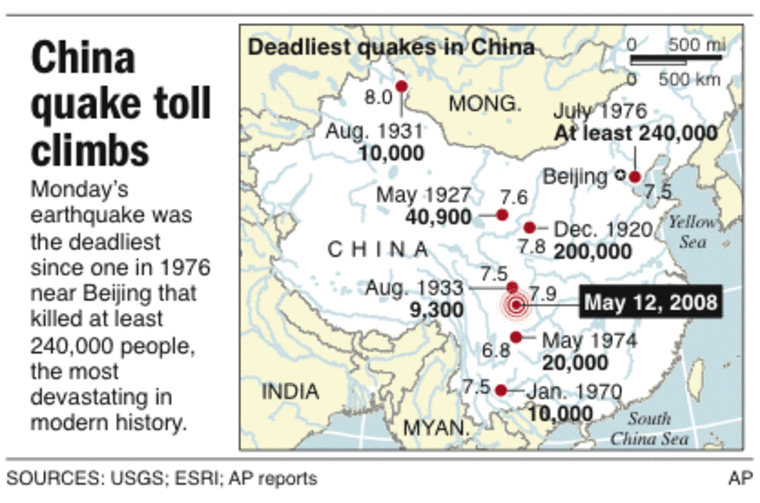Editor's note: Stephen Evans, an American in China, shared his story with msnbc.com after his brother, who lives in the U.S., told him that msnbc.com was seeking readers' stories to flesh out coverage of the disaster. Have a story or photos and videos from the China quake?
Two days after , Stephen Evans stood in a courtyard outside his Sichuan province apartment complex, whispering into a cell phone as his wife and two-year-old daughter slept in a nearby tent.
"Today's my birthday," Evans, an American who moved to China five years ago, told msnbc.com in the phone interview. "I'm 52. We were going to have a barbecue today."
The 7.9-magnitude earthquake that struck China on Monday was centered 20 miles away from Deyang City, a city of about 3.8 million people, where Evans lives. The surreal, unexpected event left Evans and his family dazed and terrified of aftershocks, but otherwise unharmed.
"They keep talking about another big one," Evans said. He and his wife, Chen Jun, had been taking shifts sleeping and keeping watch over their daughter as officials passed by, warning of more danger. "The Chinese seem to be building a mass hysteria."
Tens of thousands are dead, still buried or missing, according to China's Xinhua News Agency. Water, power and gas were cut off to Deyang following Monday's quake; Evans didn't see any injuries there until Wednesday, when he and Chen Jun volunteered at a relief station.
Evans, originally from California, is no stranger to earthquakes. But he talked about Monday's — the first he's experienced in China — with a quivering voice.
A teacher and cooking consultant, Evans had just begun his English class with Chinese middle schoolchildren. The Monday afternoon class going well: The students had started to play an English learning game when Evans felt something — "one small jolt" initially.
"Then I heard some of the students just going, 'Oh! Oh! Oh!' It was then that I realized the ground was moving."
'Crying and yelling and screaming'
Walls started to break apart; plaster rained down from the ceiling. Evans herded his 50 students down the stairs from their second-floor classroom.
"The stairway was absolutely packed," Evans said. Students were "crying and yelling and screaming and pushing, and I was trying to keep myself from being pushed down the stairs so I could try to calm them."
As Evans directed his students down the stairs in English, a fellow teacher did the same thing in Chinese.

Miraculously, out of 6,000 students, Evans only saw one who got injured during the rush into the school's quadrangle. It was a boy who had to be carried because he had hurt his foot.
The hours that followed, Evans said, were chaos.
School officials sent everyone home. Evans couldn't get in touch with his wife and Essie, their 2-year-old, who had been downtown when the quake struck.
Aftershocks rocked the area, coming every few hours at first. Police roamed Deyang, ordering residents to stay outside, fearing the aftershocks could cause buildings to collapse. Evans snuck into his apartment a few times to send e-mails to his family in the U.S.
Stores were open for a good part of the day, he said, but then closed when their shelves had been emptied.
"All the cookies and crackers and instant noodles are all gone. I bought a couple of cases of bottled water — I don't know how long that will last."
Agonizing wait to be reunited with family After an agonizing eight hours, his wife and daughter arrived home, safe but exhausted from trying to find one of the few taxis that would still take passengers. No buses were running; cell phone service was intermittent.
Evans' brief trips inside his apartment revealed pictures knocked off walls, and belongings tossed from shelves, but no major damage.
Other FirstPerson reports from China trickled into msnbc.com in the days after the quake.
Another teacher, American Mark Repesh, wrote about his experience in his classroom in Xindu, an outlying district of Chengdu, Sichuan's capital city.
"I stood in the doorway and directed my students away from the windows, which run along one wall of the classroom. They attempted to push past me into the hallway, but there were ceiling tiles and light fixtures falling from the ceiling. I didn't allow them to leave the classroom until the shaking stopped."
Seth Weiner, an ESL teacher stationed in Xi'an — a city about 400 miles northeast of Chengdu — echoed the feeling of panic Evans had described after the quake: "The street was choked with people who had fled their businesses and apartments. Some were hysterical and crying," he wrote. "Traffic was almost at a standstill on my street."
'The Olympics are a sign of peace and hope'
Despite the death and destruction, there were acts of resilience and courage.
Signa Cook, another American in China who lives in Jingzhou, Hubei, about 500 miles from the epicenter, wrote, "China has had a tough year so far, but the Olympics are a sign of peace and hope and the Chinese embrace this with a fervor and vigor like I have never seen."
Charles Skowronski, from Cheektowaga, N.Y., and currently living in Pengshan, China, about 20 miles south of Chengdu, wrote, "It was truly amazing to see how devoted the hospital staff in the affected area reacted. Newborns were all evacuated from the hospital by nurses as well as those who could walk, while nurses in ICU stayed at their posts to ensure that those patients remained well-cared for."
He added, "I have never seen so many people act so selflessly to ensure the safety of so many."
